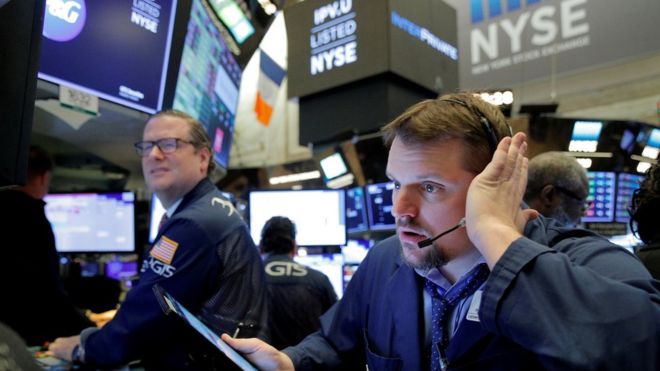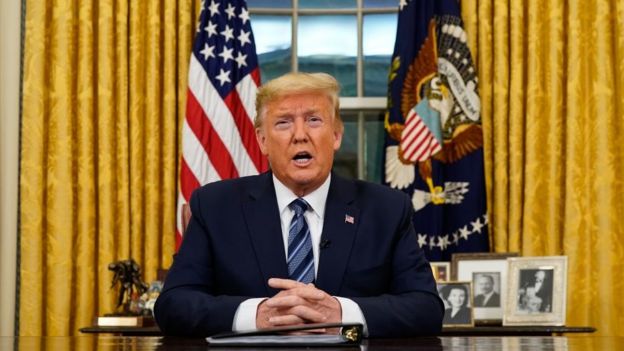Coronavirus: Global stocks plunge as coronavirus fears spread

From BBC
Shares around the world are in free-fall as investors see the spread of coronavirus bringing the world economy to a halt and fear leaders are not responding effectively.
At the start of US trading, shares plunged and triggered an automatic temporary suspension in trading aimed at curbing panicky selling.
When trade resumed, shares continued to fall, following European markets lower.
The initial declines came after the US restricted travel from mainland Europe.
The Dow led falls among the US indexes, dropping more than 9%.
The UK’s main share index, the FTSE 100, closed the day down 639 points or 10.87%, its biggest daily fall since October 1987, with some £160.4bn in value wiped off the market.
Earlier, stocks in Asia also saw big falls, with Japan’s benchmark Nikkei 225 index closing 4.4% lower.
“We can call this a market crash – particularly given speed and sharpness, as well as the size of the declines,” said Supriya Menon, senior multi-asset strategist at Pictet Asset Management. The “question is whether this will cause a recession”.
Losses on European indexes accelerated after the European Central Bank (ECB) failed to cut interest rates, although it did pledge fresh stimulus measures.
Meanwhile, rate cuts by the US central bank last week and the Bank of England on Wednesday appear to have had little effect.
Former Goldman Sachs chief economist Lord Jim O’Neill said cutting interest rates has limited impact – especially if travel and other activities are being restricted.
“What we really need is some huge confidence that this isn’t going to cause the kind of stress and horrible loss of life in Italy everywhere else in the world,” he said.
In the UK, every single share in the FTSE 100 index was trading lower. Once again, travel companies saw some of the biggest falls, with airline group IAG down more than 10% and Tui falling 20%.
Other companies warning on the impact of Covid-19 on Thursday included:
- Norwegian said it would ground 40 percent of its long-haul fleet and cancel up to 25 percent of its short-haul flights until the end of May
- WH Smith issued a profit warning after the outbreak hit sales in its travel division, which includes store at airports and train stations
- Cineworld shares fell by more than 40%. It said that in a worst-case scenario, there was a risk it might not be able to repay its debts
- Estate agent Savills said the outbreak had caused a big drop in transactions in China and across Asia
- Princess Cruises, a line owned by Carnival, said it would suspend operations for 60 days.
Oil prices also fell, with Brent crude down more than 6% at about $33 a barrel.
On the floor of the New York Stock Exchange, tensions were high. Some traders were speculating the tumbles could trigger a second trading suspension – something that has never happened, not even during the financial crisis.
- Trump halts travel from Europe to US
- UK expected to step up coronavirus response
- Coronavirus: LV pulls out of travel cover


Investors are waiting to see what kind of economic relief the US will unveil.
In a presidential address on Wednesday, US President Donald Trump announced a 30-day ban on travellers from 26 European countries.
He also said the government would extend deadlines for tax payments for those affected, increase loans to small businesses and provide financial relief for US workers who are ill, quarantined or caring for others due to the illness.
However, Michael Hewson, chief market analyst at CMC Market, said financial markets reacted badly to the Presidential address, as the new measures “don’t appear to go far enough”.
Republicans and Democrats in Congress appear at odds over additional steps while Mr Trump’s favoured approach – a tax cut for workers – has failed to garner widespread support.


Why should I care if stock markets fall?
Many people’s initial reaction to “the markets” is that they are not directly affected, because they do not invest money.
Yet there are millions of people with a pension – either private or through work – who will see their savings (in what is known as a defined contribution pension) invested by pension schemes. The value of their savings pot is influenced by the performance of these investments.
So big rises or falls can affect your pension, but the advice is to remember that pension savings, like any investments, are usually a long-term bet.


The Western world’s three largest central banks have now pitted their collective firepower against the economic chill caused by the coronavirus – to little effect.
Stock markets continue to slide. The FTSE 100 began the day looking rocky, opening 5% down, and by early afternoon it had nearly doubled that loss to be off 9.5%.
If trading were to stop now, it would be one of the biggest one-day falls in history. The largest drop was on 20 October 1987 when the FTSE 100, then just three years old, fell 12.2% on the day after Black Monday.
Observers again might wonder what new information is spooking investors, given that central banks have in the last 10 days done their best to halt the slide. In truth, there is little new – most traders already knew that the virus is likely to cause significant economic disruption likely to push most Western economies into recession.
What may have spooked them again is President Donald Trump’s decision to stop most travel between continental Europe and the United States – a big enough factor in itself, but more importantly, the manner in which it was done. There was no consultation, and Mr Trump looked uncharacteristically uncertain, as if he, too, had finally been panicked by the virus.
There is also a small, but telling detail – Mr Trump first said the ban would apply to cargo flights, but then corrected himself to say it would not. A big proportion of cargo, however, is carried in the belly holds of passenger aircraft. If there are no passenger flights, there will be much less cargo, an enormous disruption to exporters and manufacturers on both sides of the Atlantic.
America’s Dow Jones index took its lead from the FTSE 100 and opened with another big fall. Get ready for even more stimulus from the Federal Reserve.
For more on this story go to; https://www.bbc.com/news/business-51829852





